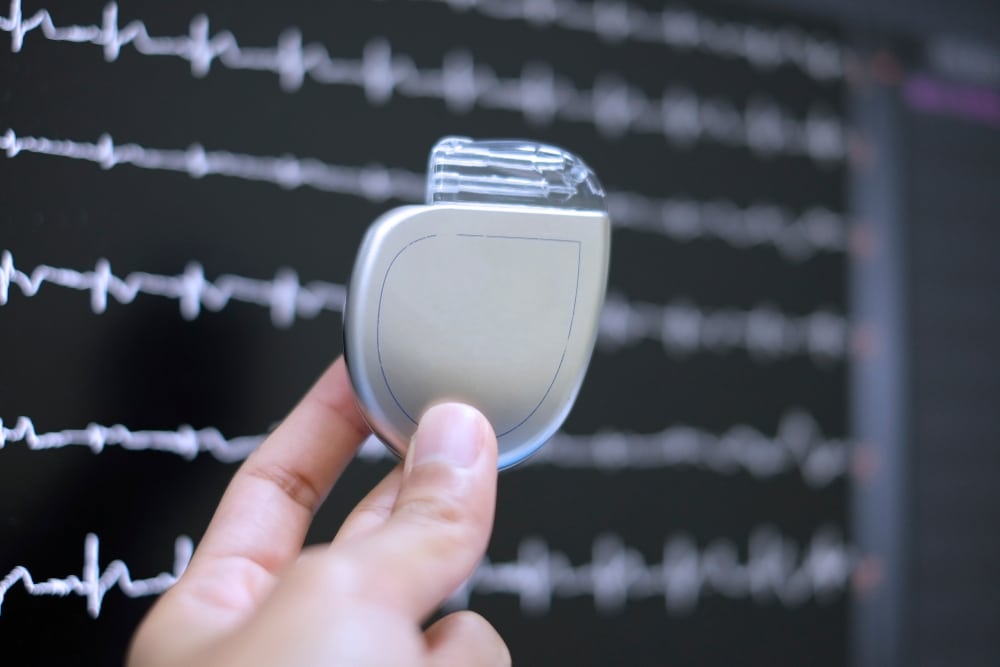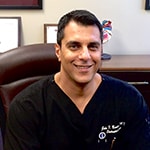For patients with arrhythmia, maintaining a regular heartbeat is critical. If your arrhythmia is severe, then implantable devices can be life-saving. One option is the implantable cardioverter defibrillator or ICD. With the right approach from Dr. Beshai, you can rest easy knowing you’ll be protected for the long term. Here’s what you need to know about this treatment option and how it can help and actually save your life!
What is an implantable cardioverter defibrillator?
An ICD is a small, battery-powered device about the size of a pocket watch that both detects heart arrhythmias and administers a small shock to the heart in order to regulate or reset the heartbeat. The fascinating feature of an ICD is that it also acts as a pacemaker with the capability of providing heart rate support when the heartbeat is slow. This ensures that there’s little interruption in your body’s blood flow and thus reduces the chance of an acute life-threatening event going untreated. Think of it as your own personal implantable emergency squad! The battery lasts anywhere from 8-12 years depending on how much work it is doing.
Why does Dr. Beshai use a cardioverter defibrillator?
ICDs are extremely effective at preventing serious problems that come with life-threatening arrhythmias. It comes with the benefits of regulating both a heartbeat that is too fast and a heartbeat that is too slow, meaning it can cover a variety of concerns. The ICD stores information regarding your heart, lead, and device function which can be transmitted for review by Dr. Beshai remotely. This allows for constant monitoring of your heart condition and device function.
Who is a candidate for an implantable cardioverter defibrillator?
ICDs are best if you have a risk of life-threatening arrhythmias which includes patients with prior history of heart attack, congestive heart failure, or fainting spells. There are other inherited conditions where an ICD may be recommended such as Long QT syndrome, Brugada syndrome, Arrhythmogenic Right Ventricular Cardiomyopathy, or Hypertrophic Cardiomyopathy.
What happens during the cardiac defibrillator procedure?
The implantation procedure is performed under sedation and the use of a local anesthetic. The device is implanted under the skin, 2 inches below the collar bone on the left side. A small 2-3 cm incision is made and the wires are placed through a large vein under the collar bone through a small IV-like catheter. These wires are then attached to the device and placed under the skin.
The wires inside the heart act as antennas that detect and process information regarding your heartbeat. This information is then transmitted directly to the device where decisions are made to pace or deliver a life-sustaining shock. The incision is then closed using dissolvable stitches and biological glue applied to the skin. This allows for the ability to take a shower the next morning! The procedure takes only 45 minutes to an hour and most patients can go home the same day.
What is the recovery process like?
Most patients experience some soreness after the implantation procedure which is relieved using over-the-counter analgesics such as acetaminophen or ibuprofen. You can expect to recover for a couple of days and return to a regular schedule within 5-7 days. You will be restricted from moving your arm above shoulder level for 8 weeks as this could result in dislodgement of the leads. An appointment with Dr. Beshai within 2 weeks will be scheduled to evaluate the surgical site and ICD function. In addition, your device will be enrolled in a remote monitoring service and you will be given a home device that will communicate and transmit important information to Dr. Beshai.
Schedule a Consultation
An ICD can be a life-saving device that allows you to live your life without worry. We will take good care of you! To meet with Dr. Beshai, an experienced cardiac electrophysiologist and learn more about your options, we invite you to contact the Heart Rhythm Institute of Arizona by calling or filling out our online form.
Dr. Beshai is a board-certified electrophysiologist internationally renowned and respected for his expertise and research. Having published in major medical journals and travelled all over the world to present research, he is dedicated to providing innovative, state-of-the-art care to his patients.
- John F. Beshai, MD
- John F. Beshai, MD
- John F. Beshai, MD
- John F. Beshai, MD
- John F. Beshai, MD
- John F. Beshai, MD
- John F. Beshai, MD
- John F. Beshai, MD
- John F. Beshai, MD


